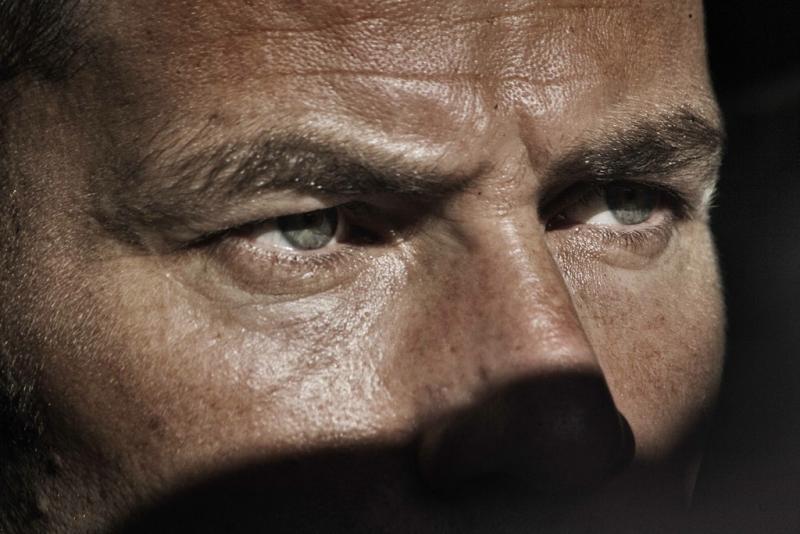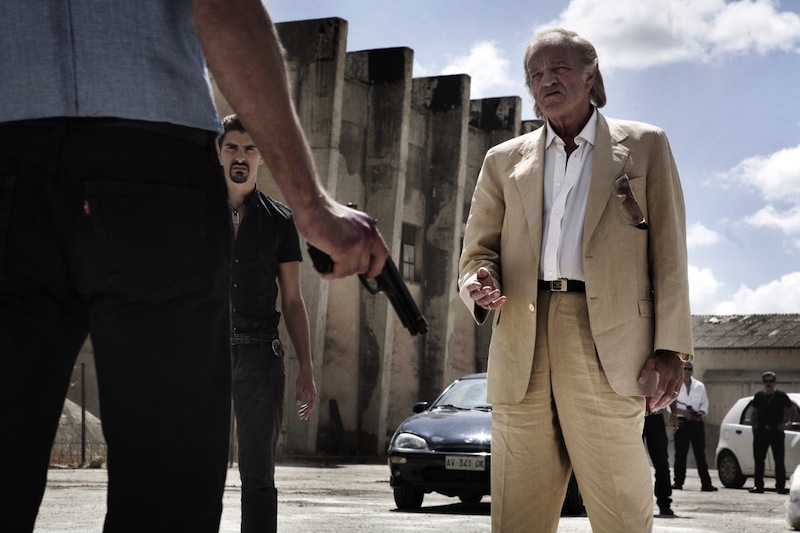Salvo | reviews, news & interviews
Salvo
Salvo
There are intimations of 'Le Samouraï' in this coolly efficient Italian crime drama

Given the world’s most famous crime organisation hails from Italy, it’s odd that we associate the best crime movies with elsewhere, notably Hollywood (not least its quintessential Mafia films, The Godfather and The Godfather Part II). But Italian directors have been contributing some memorable additions to the genre of late. And following The Consequences of Love and Gomorrah comes the scintillating Salvo.
It opens with a terrific extended sequence. As Salvo (Saleh Bakri) drives his boss (Mario Pupella) through the Palermo streets, he’s edgy, expecting trouble – as though trouble comes routinely every morning. When it does, indeed, come, he’s prepared. Having ruthlessly dispensed with the threat in a short, sharp gunfight, Salvo keeps moving – now on foot – till he reaches the home of the person who ordered the hit.
 Inside, he finds the man’s blind sister Rita (Sara Serraiocco, pictured left), and stalks her silently through the house. The petrified young woman is aware of his presence, waits for him to pounce. And then her brother calls at the door.
Inside, he finds the man’s blind sister Rita (Sara Serraiocco, pictured left), and stalks her silently through the house. The petrified young woman is aware of his presence, waits for him to pounce. And then her brother calls at the door.
Aside from some bravura choreography, from the street pursuit to the highly original, superbly tense cat-and-mouse in the house, what’s striking about the sequence is how long it takes before we get to view Salvo’s face, other than his eyes; like the girl, we’re blind to his identity. Yet we’re left in no doubt as to this young killer’s focussed, relentless personality. This strength of purpose will slowly be called into question by the presence of the girl, whose sight seems to have been returned by her traumatic experience.
This film’s clearest antecedent, funnily enough, is neither Italian nor American, but French, namely Melville’s Le Samouraï. Like Alain Delon’s ice-cold assassin Jef Costello, Salvo is a loner, for whom solitude is part and parcel of his professionalism. Both live in tiny, spartan accommodation, Salvo renting a room in a couple’s apartment, the pair waiting on him without thanks or acknowledgment. While Costello had a caged bird in his room, Salvo has a dog. Each man deals with his wounds with impressive nonchalance, each has the sort of good looks that freeze the blood.
 And like Jef, Salvo will eventually be at odds with his employer. Pupella (pictured right) has something of the mad Klaus Kinski about him, his character slowly cracking up under the strain of the world he’s created for himself. “I even want to check the breath of whoever’s around me,” he confesses to his taciturn enforcer. They live like rats, he observes, but “this is our life, the only one we’ve got.” The boss voices the existential crisis that the silent Salvo will act out, as he feels compelled to protect a witness he once would have killed.
And like Jef, Salvo will eventually be at odds with his employer. Pupella (pictured right) has something of the mad Klaus Kinski about him, his character slowly cracking up under the strain of the world he’s created for himself. “I even want to check the breath of whoever’s around me,” he confesses to his taciturn enforcer. They live like rats, he observes, but “this is our life, the only one we’ve got.” The boss voices the existential crisis that the silent Salvo will act out, as he feels compelled to protect a witness he once would have killed.
This is a confident, fascinating, punchy debut from Sicilian writer-directors Fabio Grassadonia and Antonio Piazza. That opening sequence alone would suffice as a calling card, but the whole film is full of refreshing touches, from the comedy of Salvo’s exchanges with his reluctant landlords, to the enjoyably efficient evasion of a police search in a traffic jam, and the Wild West feel of his stand-off with his former accomplices.
All the while, we are reminded – in a way that this emotionally stunted anti-hero can’t fathom – of the fear and confusion of a woman whose returning sight could not be more joyless.
Overleaf: watch the trailer for Salvo
The future of Arts Journalism
You can stop theartsdesk.com closing!
We urgently need financing to survive. Our fundraising drive has thus far raised £49,000 but we need to reach £100,000 or we will be forced to close. Please contribute here: https://gofund.me/c3f6033d
And if you can forward this information to anyone who might assist, we’d be grateful.

Subscribe to theartsdesk.com
Thank you for continuing to read our work on theartsdesk.com. For unlimited access to every article in its entirety, including our archive of more than 15,000 pieces, we're asking for £5 per month or £40 per year. We feel it's a very good deal, and hope you do too.
To take a subscription now simply click here.
And if you're looking for that extra gift for a friend or family member, why not treat them to a theartsdesk.com gift subscription?
more Film
 The Mastermind review - another slim but nourishing slice of Americana from Kelly Reichardt
Josh O'Connor is perfect casting as a cocky middle-class American adrift in the 1970s
The Mastermind review - another slim but nourishing slice of Americana from Kelly Reichardt
Josh O'Connor is perfect casting as a cocky middle-class American adrift in the 1970s
 Springsteen: Deliver Me From Nowhere review - the story of the Boss who isn't boss of his own head
A brooding trip on the Bruce Springsteen highway of hard knocks
Springsteen: Deliver Me From Nowhere review - the story of the Boss who isn't boss of his own head
A brooding trip on the Bruce Springsteen highway of hard knocks
 The Perfect Neighbor, Netflix review - Florida found-footage documentary is a harrowing watch
Sundance winner chronicles a death that should have been prevented
The Perfect Neighbor, Netflix review - Florida found-footage documentary is a harrowing watch
Sundance winner chronicles a death that should have been prevented
 Blu-ray: Le Quai des Brumes
Love twinkles in the gloom of Marcel Carné’s fogbound French poetic realist classic
Blu-ray: Le Quai des Brumes
Love twinkles in the gloom of Marcel Carné’s fogbound French poetic realist classic
 Frankenstein review - the Prometheus of the charnel house
Guillermo del Toro is fitfully inspired, but often lost in long-held ambitions
Frankenstein review - the Prometheus of the charnel house
Guillermo del Toro is fitfully inspired, but often lost in long-held ambitions
 London Film Festival 2025 - a Korean masterclass in black comedy and a Camus classic effectively realised
New films from Park Chan-wook, Gianfranco Rosi, François Ozon, Ildikó Enyedi and more
London Film Festival 2025 - a Korean masterclass in black comedy and a Camus classic effectively realised
New films from Park Chan-wook, Gianfranco Rosi, François Ozon, Ildikó Enyedi and more
 After the Hunt review - muddled #MeToo provocation
Julia Roberts excels despite misfiring drama
After the Hunt review - muddled #MeToo provocation
Julia Roberts excels despite misfiring drama
 Ballad of a Small Player review - Colin Farrell's all in as a gambler down on his luck
Conclave director Edward Berger swaps the Vatican for Asia's sin city
Ballad of a Small Player review - Colin Farrell's all in as a gambler down on his luck
Conclave director Edward Berger swaps the Vatican for Asia's sin city
 London Film Festival 2025 - Bradley Cooper channels John Bishop, the Boss goes to Nebraska, and a French pandemic
... not to mention Kristen Stewart's directing debut and a punchy prison drama
London Film Festival 2025 - Bradley Cooper channels John Bishop, the Boss goes to Nebraska, and a French pandemic
... not to mention Kristen Stewart's directing debut and a punchy prison drama
 London Film Festival 2025 - from paranoia in Brazil and Iran, to light relief in New York and Tuscany
'Jay Kelly' disappoints, 'It Was Just an Accident' doesn't
London Film Festival 2025 - from paranoia in Brazil and Iran, to light relief in New York and Tuscany
'Jay Kelly' disappoints, 'It Was Just an Accident' doesn't
 Iron Ladies review - working-class heroines of the Miners' Strike
Documentary salutes the staunch women who fought Thatcher's pit closures
Iron Ladies review - working-class heroines of the Miners' Strike
Documentary salutes the staunch women who fought Thatcher's pit closures
 Blu-ray: The Man in the White Suit
Ealing Studios' prescient black comedy, as sharp as ever
Blu-ray: The Man in the White Suit
Ealing Studios' prescient black comedy, as sharp as ever

Add comment